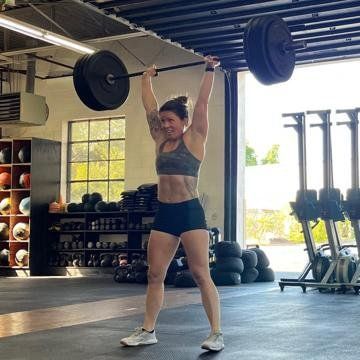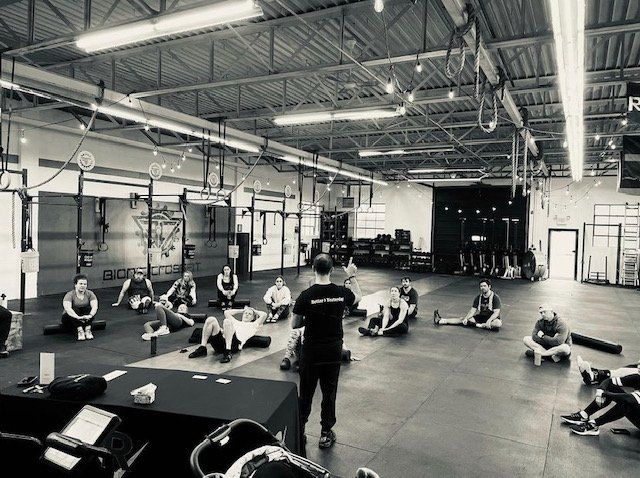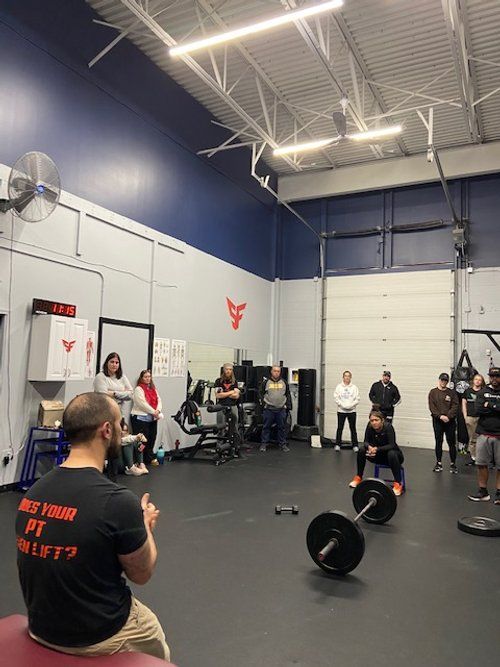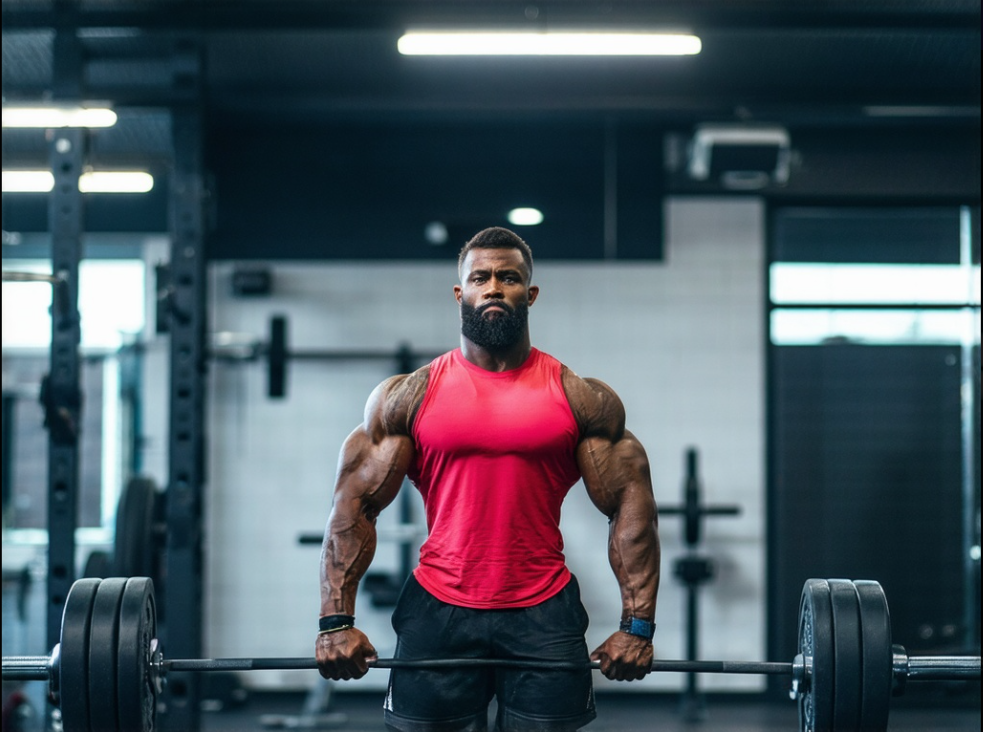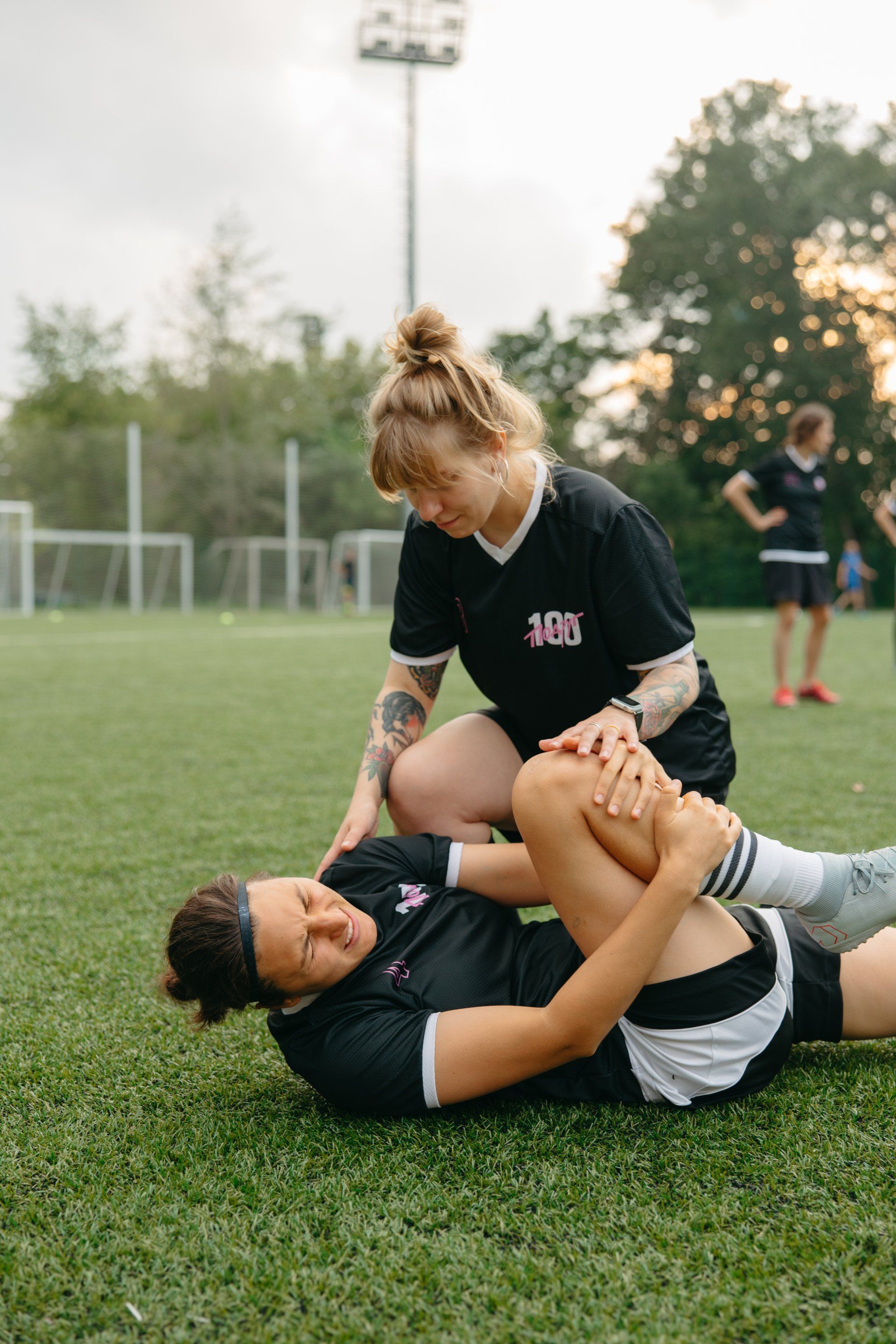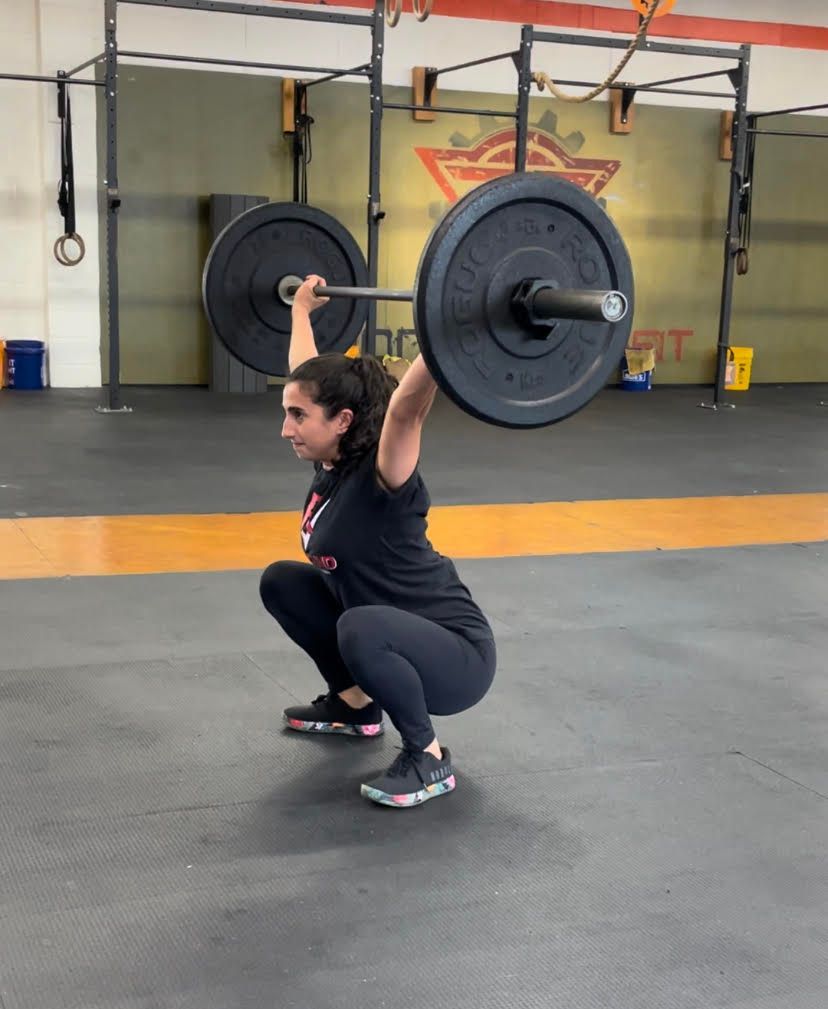Overcoming Soccer Injuries with Sports Physical Therapy
Soccer is a fast-paced, high-impact sport that forces multi-directional speed and change of pace frequently throughout practices and competition. Whether you're a beginner or an experienced player, injuries are a common occurrence in soccer. Physical therapy can be an effective resource to recover quicker from an injury or be used to improve performance through improving qualities that may have not emerged in the athlete. In this guide, we'll explore how physical therapy can help you overcome soccer injuries and get back to the pitch as a better athlete.

Common Soccer Injuries
Injuries are an inevitable part of any sport. From sprained ankles to ACL tears, players may face a range of injuries that can sideline them for weeks to months. The most common injuries in soccer include:
Ankle sprains
- Minimum 4-6 weeks return to play
- One of the most common soccer injuries
- Acute phase: reduce pain and swelling, increase pain free range of motion, improve strength the ankle muscles
- Return to play: sprinting and hopping progressions, change of direction, change of speed, conditioning
- Advice : continue to utilize lace up brace while playing 4-6 months following initial injury to reduce risk of second sprain.
Knee injuries (ACL, MCL and meniscus tears)
- ACL Tear: Minimum 9-12 months return to play
- MCL and meniscus tears: minimum 3-6 months return to play
- Depends on severity, type of tear and surgical protocol
Hamstring and Groin strains
- Minimum 3-6 weeks return to play
- Depends on severity and patient response to treatment
Concussions
- Minimum 2-3 weeks return to play
- Depends on severity and patient response to treatment
How Does PT Help Treat Soccer Injuries?
Physical therapy is a key component of injury recovery in soccer. Some of the benefits include pain relief, improvement in flexibility and range of motion, strengthening muscles to stabilize the joint and quicker recovery times.
1. Pain Relief
Physical therapy can help alleviate pain from soccer injuries by using strategies such as soft tissue mobilization, stretching, and strengthening exercises. Depending on the affected tissue and joint, some of these strategies may work better than others. Receiving patient feedback, measuring progress each day and understanding how pain is progressing with activity will give a better prognosis of when it is appropriate to return to drilling, practice, scrimmaging and game time.
2. Improved Flexibility and Range of Motion
Physical therapy can also help improve flexibility and mobility to promote pain free range of motion, which can reduce the risk of future injuries. Common injuries seen due to diminished flexibility are hip flexor strains, glute/hamstring strains, adductor strains and ankle sprains. Strains are seen following striking the ball on the swinging limb, during quick changes of direction or when chasing down a ball at max velocity.
3. Strengthening Muscles and Preventing Future Injuries
Physical therapy will allow you and your PT to take a step back and test your functional and muscular strength as well as how well you can stabilize your body. Functional strength can be tested in double and single limb stance under static or dynamic positions. If we are testing specific musculature, we use MicroFet 2 which tests force output in real time. As you progress through PT, further testing will look like game play scenarios, assessing jumping, hopping and change of speed and direction.
4. Quicker Recovery Time
Physical therapy can help speed up the recovery process by promoting healing and reducing inflammation. Everyone wants to get back by yesterday, but pushing too quickly may result in setbacks from full recovery. Receiving guidance of exactly which interventions will elicit the greatest response for you during the healing process will aid in how quickly you get back to the pitch. Determining how much volume, intensity and frequency for each intervention is a conversation you should be having with your PT each week to ensure you are receiving the maximum benefit from your physical therapist.
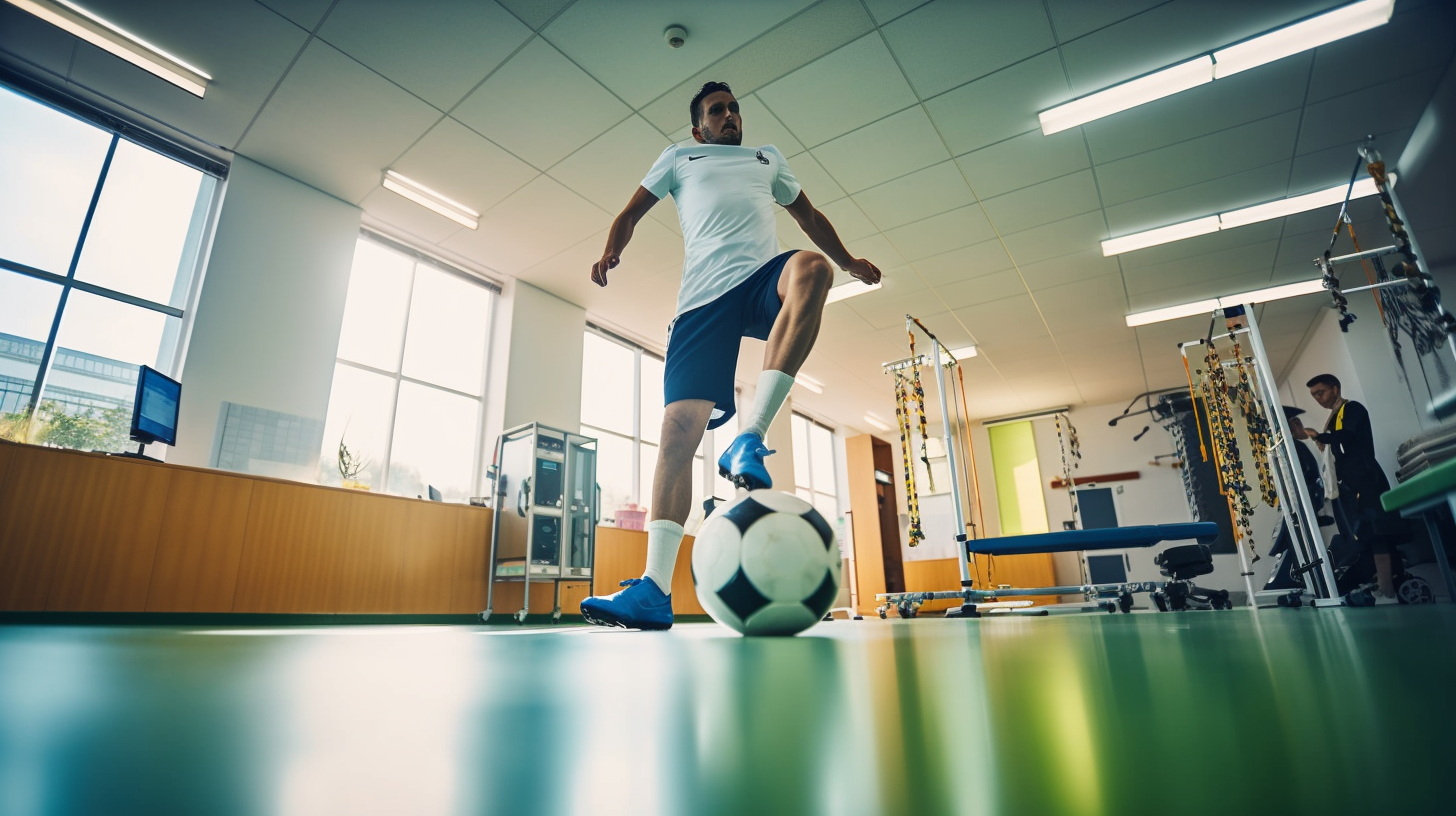
Choosing The Right Physical Therapist
Choosing the right physical therapist is essential for successful injury recovery and prevention. Look for a therapist who specializes in sports injuries and has experience working with soccer players. They should also be knowledgeable about the latest techniques, treatments for soccer specific injuries and include a battery of tests for safe return to full clearance.
Soccer Success Stories
We’ve had an awesome time getting our soccer athletes back to playing. Take a look at what some our patient’s have had to say:
“In June of 2021, I suffered a devastating ACL tear heading into my senior year of high school. A month later, I met Jon for the first time and began the long physical therapy process. It was an extremely difficult task for me to gain the strength to walk and bend my knee properly again, but Jon provided unwavering support and encouragement as I took these intimidating steps for the first time since my procedure. Seven months later, I was back on track, literally running track and field again! This was an accomplishment I never thought was possible, but at Rebound the possibilities are endless with hard work. Going into physical therapy I was apprehensive, totally unconfident in my new knee. Yet the staff made me feel at home immediately, and within a week I was already seeing amazing results! Jon’s positive and uplifting energy quickly rubbed off on me and gave me the newfound confidence that I needed to grow stronger. After working with Rebound Physical Therapy, I began to trust my knee again and look forward to physical therapy. Jon provides the utmost patience and concern for me every session, pushing me to become my best self while understanding my limitations as well. While his skills in physical therapy are clearly unmatched, Jon provides more than just that — at Rebound, you’ll find a physical therapist who truly cares for you wholeheartedly, mentally and physically.” - O.D.
“I came to Jon with a pretty bad ankle sprain. I had only one goal and it was to play on my Senior night; which was about a month after my injury. At first I was nervous that I would not be able to play, but after just a week with Jon I was walking without my crutches in a boot and I was hopeful. Jon always kept things positive, but never sugarcoated things which I enjoyed. He was upfront throughout the whole recovery process which kept me going. The best part about working with Jon has to be his personality. He is so enthusiastic and you can tell he loves what he does, and it makes a huge difference in the quality of treatment. I always enjoyed going to PT with Jon because he is such a positive person and brings so much energy to even the littlest exercises. With the enthusiasm from Jon I knew everything would be okay, and a week before my Senior Night I was sprinting and cutting without any pain. Jon was able to push me during PT in order to reach my goal. Some days were better than others, but I with Jons help I was able to always see results once I left PT even if it was something minor. I have never had such a positive experience with a Physical Therapist before, and I would recommend Jon to anyone who is in need of someone who is enthusiastic, caring, and hardworking.”
“My daughter met Jonathan a couple years ago for a knee injury from playing soccer. She had a great experience with him, he is not only knowledgeable but fun and encouraging. When she recently injured the same knee I reached out to him right away. She arrived on crutches and not bearing any weight on her knee. This was about 4 weeks before her junior year soccer season. She was terrified she wasn’t going to be able to play. Jonathon had her walking within a week and fully cleared to play by her first game! I highly recommend reaching out to Jonathon for any injury. His knowledge, positivity and encouragement plays a huge part in recovery.”

Wrap Up
Soccer injuries can be frustrating and prevent you from playing the sport you love. Physical therapy is an effective way to recover from injuries and decrease the risk of injury. By following the tips in this guide and working with a skilled physical therapist, you can get back on the field and continue to play soccer safely as a better athlete.
FAQs
1.How long does physical therapy take for soccer injuries?
The length of physical therapy for soccer injuries depends on the severity of the injury and the individual's progress. It can range from a few weeks to several months.
2.Can physical therapy prevent soccer injuries?
While there is no definitive way to prevent any injury, you can decrease the likelihood of injury by warming up properly (performing customized corrective exercise, drills that are specific to soccer), using proper technique when kicking and changing direction, wearing appropriate protective gear (use of lace up brace following an ankle sprain), and conditioning your body with exercises recommended by a physical therapist.
3.Can physical therapy be used for chronic soccer injuries?
Yes! Physical therapy can be used for chronic soccer injuries as it can help manage pain, improve mobility/flexibility, and prevent further compensations and pain from progressing. It is important to work with a physical therapist to develop a personalized treatment plan for your specific injury.
Recent Blog Post


